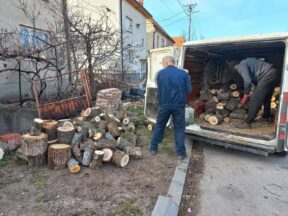
It all started with a paragraph in a Christmas letter.
A pastor in Serbia sent a simple request to his friends, including Paraclete associates Doug and Jan Hamm. An 8-year-old boy, Nikola, and his grandparents didn’t have heat in their home to get through the winter. The boys’ parents had died. The grandparents had lost their jobs and they couldn’t pay the electric bill. And could someone help?
The Hamms let their supporters in the States know of the request. Within two weeks, $1,000 had come in to help.
“They’re like all of us,” Doug Hamm said. “They just have a need to know that somebody in this world knows about them and cares about them. We need that human connection.”
This family is from a particular small town that few outsiders ever visit.
“It’s not on the way to anywhere,” Doug Hamm said. “To go there, you really want to go there.”
And the Hamms do. While the Hamms are now based out of the Omaha, Neb. area, they travel two or three times a year to encourage pastors and friends in Serbia. The Hamms have decades’ worth of connection with these communities. They lived there for 23 years, mentored and grew a national team of ministry leaders and workers for another organization. They also became friends with many pastors who sacrificially serve small, underresourced churches without pay.
Some of those years—especially the “war years” of the 1990s—the rest of the world believed a different story about Serbs.
“The Serbs were always the bad guy,” Hamm said. “They were always the terrorists, the killers.”
And so, in ministry newsletters back to the States, paragraph by paragraph, the Hamms did what they could to set the record straight.
“We would try to put a human face to them in our prayer letters,” Hamm said. “And we lost some support because of that.”
Working in the midst of tensions is pretty normal for Protestant pastors in Serbia. Some pastors started churches when the government was still communist. Some communities have lost trust with Eastern Orthodox priests who have misused their power to require donations and submission to their authority. And that distrust carries into other Christian circles. Some families ostracize anyone who leaves traditional faith systems for Protestant Christianity. As a result, pastors’ flocks are small but have many needs.
And yet, pastors “seem to be fearless to go where there is no church,” Hamm said.
When the Hamms visit these pastors, they sometimes lead a retreat for them, encouraging moments of rest and recuperation. They’ve assisted friends who need professional counseling.
But mostly, “we’ve done a lot of listening,” Doug Hamm said.
Not all of the results of the Hamms’ ministry are tangible. But in the case of the boy and his grandparents, the money was enough to restore the family’s electricity and pay for food and wood for winter heat.

In her own thank you paragraph this time, the grandmother shared what it really meant to them.
“Because of unemployment, we went a very long time without any kind of paycheck and had to go deep into debt,” the grandparent wrote back. “For three months we were without electricity. I want to take this opportunity to thank you for your help. We paid our electric bill with your gift and had enough left over to buy some groceries and wood for heating. Thank you. Your gift has allowed us to return to a little bit of normal life.”

